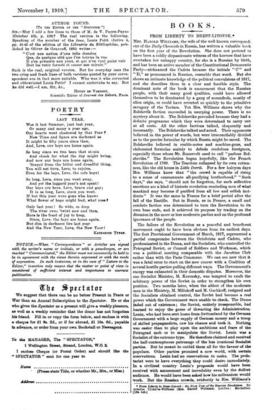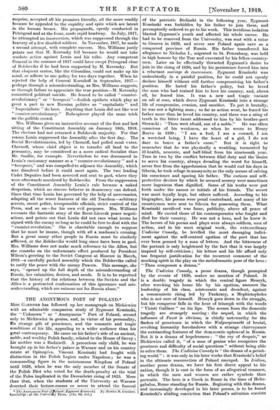BOOKS.
FROM LIBERTY TO BREST-LITOVSK,*
MRS. HAROLD WILLIAMS, the wife of the well-known correspond. ent of the Daily Chronicle in Russia, has written a valuable book on the first year of the Revolution. She does not pretend to have been a coldly dispassionate witness of the horrors that have overtaken her unhappy country, for she is a Russian by birth, and has been an active member of the Constitutional Democratic Party—nicknamed the Cadets because the initials " C " and " I)," as pronounced in Russian, resemble that word. But sho shows an intimate knowledge of the political convulsions of 1917, and she describes them in a clear and forcible style. The dominant note of the book is amazement that the Russian people, with their many good qualities, could have allowed themselves to be dominated by a gang of scoundrels, mostly of alien origin, or could have reverted so quickly to the primitive savagery of the Tartars. Yet Mrs. Williams shows why the Bolshevik faction succeeded in usurping power. There is no mystery about it.. The Bolsheviks prevailed because they had a definite programme which they were determined to carry out at all costs. All the other factions talked, eloquently and incessantly. The Bolsheviks talked and acted. Their opponents believed in the power of words, but were irreconcilably divided as to the precise formulae by which Russia might be saved. The Bolsheviks believed in rouble-notes and machine-guns, and elaborated formulae mainly to delude credulous foreigners, especially those whom Mr. Roosevelt used to call "parlour Bolsheviks." The Revolution began hopefully, like the French Revolution of 1789. The Tsardom collapsed by its own rottenness, like the old house in Little Dorrit. For a few halcyon days Mrs. Williams knew that " the crowd is capable of rising to a sense of consummate all-purifying brotherhood." " Such days," she says, " should not be forgotten, for such collective emotions are a kind of historic revelation reminding men of what mankind may become if purified from all low and selfish incidents." It was the same in France for a brief period after the fall of the Bastille. But in Russia, as in France, a small and resolute faction was determined to turn the Revolution to its own base ends, and it achieved its purpose by trading on the disunion in the more or less moderate parties and on the profound ignorance of the people.
The failure of the Revolution as a peaceful and beneficent movement ought to have been obvious from its earliest days. The first Provisional Government of March, 1917, represented a partial compromise between the Octobrists and Cadets, who predominated in the Duma, and the Socialists, who controlled the Petrograd Soviet, or Council of Soldiers and Workmen, which was a political meeting comparable with the Jacobins Club rather than with the Paris Commune. We can see now that it was a fatal error to start on the new course with a Coalition of several hostile parties pulling different ways. The Government's energy was exhausted in their domestic disputes. Moreover, the one Socialist Minister, M. Kerensky, was tempted to exalt the arbitrary power of the Soviet in order to strengthen his own position. Two months later, when the ablest of the moderate men in the Ministry, M. Miliukoff and M. Guchkoff, resigned and the Socialists obtained control, the Soviet had become a real power which the Government were unable to cheek. The Duma faded out of existence ; the Soviet, entirely irresponsible, had learned to enjoy the game of thwarting the Administration. Lenin, who had been sent home from Switzerland by the German Government with a large supply of German money and a troop of skilled propagandists, saw his chance and took it. Nothing was easier than to play upon the ambitions and fears of the Petrograd mob or to manipulate the Soviet. Lenin was a Socialist of the extreme type. He therefore claimed and received the half-contemptuous patronage of the less irrational Socialist parties. But he meant to outbid them all for the favour, of the populace. Other parties promised a new world, with certain reservations. Lenin had no reservations to make. The proletariat were to have everything they could desire immediately. In a civilized country Lenin's proposals would have been received with amusement and incredulity even by the dullest audience. He would have been asked how his millennium would Work. But the Russian crowds, evidently to Mrs. Willis-ms's
surprise, accepted all his promises literally, all the more readily because ho appealed to the cupidity and spite which are latent in the human breast. His propaganda, openly conducted in Petrograd and at the front, made rapid headway. In July, 1917, he attempted an insurrection, which was suppressed through the bravery of a few disabled soldiers. In November, 1917, he made a second attempt, with complete success. Mrs. Williams justly points out that M. Kerensky fell because he would not take resolute action against Lenin and his tribe. Any competent General in the summer of 1917 could have swept Petrograd clear of Bolsheviks if he had been supported by M. Kerensky. But that eloquent orator, like the Girondins, could not make up his mind, or adhere to one policy for two days together. When he rejected the help of General Korniloff in September, 1917— perhaps through a misunderstanding, as Mrs. Williams suggests, or through failure to appreciate the true position—M. Kerensky committed political suicide. Ho feared to be called " counterrevolutionary" or " bourgeois " —foolish epithets which play as great a part in new Russian politics as capitalistic " and " Imperialistic " do here. Anything that Lenin did not like was "counter-revolutionary." Robespierre played the same trick on the gullible crowd.
Mrs. Williams gives an instructive account of the first and last sitting of the Constituent Assembly on January 18th, 1918. The electors had not returned a Bolshevik majority. For that reason Lenin suppressed the Assembly after the first day. The Social Revolutionaries, led by Chemoff, had polled most votes. Chemoff, whose chief object is to transfer all land to the peasantry, may be considered as a more radical Socialist than Mr. Smillie, for example. Nevertheless he was denounced in Lenin's customary manner as a " counter-revolutionary " and a "bourgeois," and was compelled to adjourn the Assembly, which was dissolved before it could meet again. The two leading Cadet Deputies had been arrested and sent to gaol, where they were afterwards murdered by Bolsheviks. From the suppression of the Constituent Assembly Lenin's rule became a naked despotism, which no sincere believer in democracy can defend. Since that time Lenin has governed by the help of mercenaries, adapting all the worst features of the old Tsardom—arbitrary arrests, secret police, irresponsible officials, strict control of the Press, and so on—for his own evil purposes. Mrs. Williams recounts the fantastic story of the Brest-Litovsk peace negotiations, and points out that Lenin did not care what terms ho signed with the enemy so long as he could be free to deal with the counter-revolution." She is charitable enough to suppose that he must be insane, though with all a madman's cunning. But a great many other people in Russia must be similarly afflicted, or the Bolsheviks would long since have been in gaol. Mrs. Williams does not make much reference to the Allies, but she remarks on the unfortunate effect produced by President Wilson's greeting to the Soviet Congress at Moscow in March, 1918—a carefully packed assembly which the Bolsheviks called to ratify the peace with the enemy Powers. This message, she mays, opened up the full depth of the misunderstanding of Russia, her calamities, desires, and needs. It is to be regretted that the history of the relations between the Soviets and the Allies is a protracted confirmation of this ignorance and misunderstanding, which are ruinous not for Russia alone."







































 Previous page
Previous page